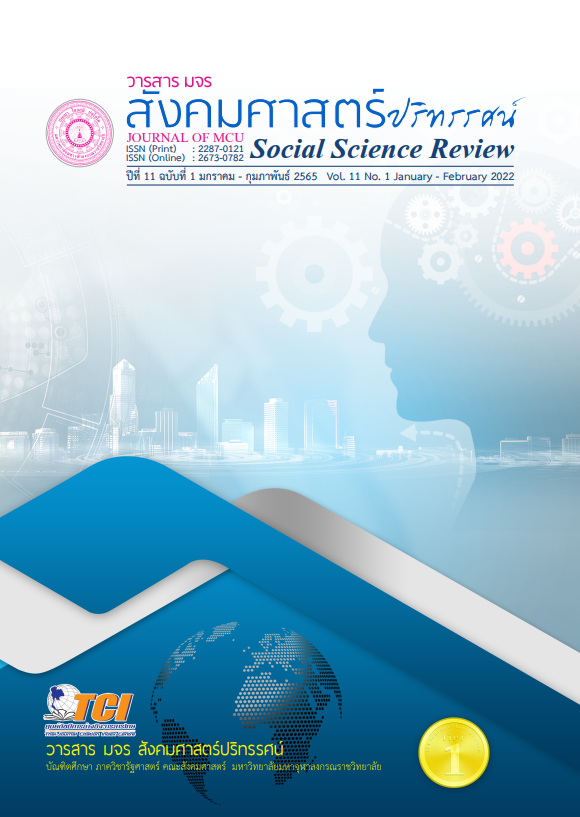รูปแบบการจัดการเรียนการสอนของพระสอนศีลธรรม ในโรงเรียนจังหวัดชุมพร
คำสำคัญ:
รูปแบบ, การจัดการเรียนการสอน, พระสอนศีลธรรมบทคัดย่อ
บทความวิจัยนี้มีวัตถุประสงค์เพื่อศึกษาสภาพทั่วไป กระบวนการ และนำเสนอรูปแบบการจัดการเรียนการสอนของพระสอนศีลธรรมในโรงเรียนจังหวัดชุมพร เป็นการวิจัยแบบผสานวิธี ระหว่างการวิจัยเชิงคุณภาพโดยสัมภาษณ์เชิงลึกกับผู้ให้ข้อมูลสำคัญ 18 รูปหรือคน และการสนทนากลุ่มเฉพาะกับผู้ทรงคุณวุฒิ 10 รูปหรือคน เครื่องมือที่ใช้ในการเก็บรวมรวมข้อมูลคือแบบสัมภาษณ์และแบบสนทนากลุ่มเฉพาะ วิเคราะห์ข้อมูลโดยการพรรณนาความ และการวิจัยเชิงปริมาณดำเนินการเก็บข้อมูลกับกลุ่มตัวอย่างจำนวน 105 รูป เครื่องมือที่ใช้ในการเก็บรวมรวมข้อมูลคือแบบสอบถาม สถิติที่ใช้ในการวิเคราะห์ข้อมูลได้แก่ ค่าความถี่ ค่าร้อยละ ค่าเฉลี่ย ส่วนเบี่ยงเบนมาตรฐาน
ผลการวิจัยพบว่า 1) พระสอนศีลธรรมส่วนใหญ่มีพรรษา 5-10 พรรษา เป็นพระสังฆาธิการมีอายุระหว่าง 31 – 40 ปี และเป็นพระลูกวัดมีอายุระหว่าง 22 – 30 ปี มีวุฒิการศึกษาทางโลกต่ำกว่าปริญญาตรี มีวุฒิการศึกษาทางธรรมสูงสุด คือ นักธรรมชั้นตรี โท เอก เป็นเปรียญธรรม 3 – 6 และมีประสบการณ์ในการสอนศีลธรรมในโรงเรียน 5–10 ปี 2) การจัดการเรียนการสอนของพระสอนศีลธรรมโดยรวมอยู่ในระดับมาก ด้านที่มีค่าเฉลี่ยสูงที่สุด คือ ด้านคุณลักษณะและเจตคติรองลงมา คือ ด้านการวัดและประเมินผลด้านเนื้อหาหลักสูตร ด้านการจัดการเรียนการสอน และค่าเฉลี่ยต่ำสุด คือ ด้านการผลิตสื่อและการใช้สื่อการสอน 3) รูปแบบการจัดการเรียนการสอนของพระสอนศีลธรรมในโรงเรียนจังหวัดชุมพร ประกอบด้วย 5 ด้าน ซึ่งสรุปเป็น Special Model
เอกสารอ้างอิง
คณะศึกษาศาสตร์ มหาวิทยาลัยขอนแก่น. (2553). แนวโน้มทางการวิจัยที่ศึกษาศาสตร์ควรมอง. ขอนแก่น: มหาวิทยาลัยขอนแก่น.
ทยิดา ผลสมบูรณ์. (2564). การบริหารจัดการของศูนย์ศึกษาพระพุทธศาสนาวันอาทิตย์ วัดนอก จังหวัดชลบุรี. วารสารสหวิทยาการนวัตกรรมปริทรรศน์, 4(1), 32-43.
บุญหนา จิมานัง และคณะ. (2551). การประเมินประสิทธิภาพการสอนของพระสอนศีลธรรมในสถานศึกษา เขตปกครองคณะสงฆ์ภาค 9 (รายงานการวิจัย). พระนครศรีอยุธยา: มหาวิทยาลัยมหาจุฬาลงกรณราชวิทยาลัย.
พรรณี ผุดเกตุ. (2555). รูปแบบการพัฒนาศักยภาพด้านการสอนของพระสอนศีลธรรมในโรงเรียนในจังหวัดสงขลา (วิทยานิพนธ์ปรัชญาดุษฎี สาขาวิชาการศึกษาเพื่อการพัฒนาท้องถิ่น). นครศรีธรรมราช: มหาวิทยาลัยราชภัฏนครศรีธรรมราช.
พรสรัญ ชัยยา. (2562). การพัฒนารูปแบบการเรียนการสอนเพื่อส่งเสริมสมรรถนะการคิดเชิงคณิตศาสตร์ของ นักเรียนมัธยมศึกษาตอนต้น (รายการงานวิจัย). กรุงเทพฯ: มหาวิทยาลัยเทคโนโลยีพระจอมเกล้าพระนครเหนือ.
พระครูปลัดอุดม โอภาโส (โซวเซ็ง). (2548). ประสิทธิภาพการสอนวิชาพระพุทธศาสนาของพระสอนศีลธรรม ในโรงเรียน อำเภอสวนผึ้ง จังหวัดราชบุรี สำนักงานเขตพื้นที่การศึกษาราชบุรี เขต 1 (วิทยานิพนธ์ พุทธศาสตรมหาบัณฑิต สาขาวิชาพระพุทธศาสนา). พระนครศรีอยุธยา: มหาวิทยาลัยมหาจุฬาลงกรณราชวิทยาลัย.
พระครูพิศิษฏ์ประชานาถและคณะ. (2564a). ยุวชนคุณธรรม : แนวทางลดปัจจัยเสี่ยงของชุมชนกระทิง อำเภออัมพวา จังหวัดสมุทรสงคราม. วารสารสหวิทยาการนวัตกรรมปริทรรศน์, 4(1), 102-115.
_______. (2564b). การพัฒนาเครือข่ายเยาวชนในการจัดกิจกรรมเสริมสร้างเครือข่าย ลดปัจจัยเสี่ยงตามแนวพระพุทธศาสนา จังหวัดสมุทรสงคราม. วารสารพุทธนวัตกรรมและการจัดการ, 4(2), 69-80.
พระปลัดปรีชา นนฺทโก. (จุลเจือ). (2561). การศึกษาแนวทางการพัฒนาศักยภาพพระสอนศีลธรรมโรงเรียนมัธยมศึกษาสังกัดสานักงานคณะกรรมการการศึกษาขั้นพื้นฐาน ในจังหวัดระยอง (วิทยานิพนธ์ดุษฎีบัณฑิต สาขาวิชาพระพุทธศาสนา). พระนครศรีอยุธยา: มหาวิทยาลัยมหาจุฬาลงกรณราชวิทยาลัย.
พระยงยุทธ กตธุโร. (2564). การพัฒนาการเรียนการสอนวิชาพระพุทธศาสนาของพระสอนศีลธรรมในโรงเรียน ในอำเภอหัวหิน จังหวัดประจวบคีรีขันธ์. วารสารพุทธนวัตกรรมและการจัดการ, 4(1), 28-36.
พระสมุห์ชูชาติ อุทโย. (2554). ความพึงพอใจของนักเรียนที่มีต่อพระสอนศีลธรรมในโรงเรียนเทศบาล 1 ตำบลเวียงเหนือ อำเภอเมือง จังหวัดชุมพร (วิทยานิพนธ์การศึกษามหาบัณฑิต สาขาวิชาการบริหารการศึกษา). กรุงเทพฯ: มหาวิทยาลัยกรุงเทพธนบุรี.
พระอลงกรณ์ กนฺตวณฺโณ. (2564). ประสิทธิภาพการจัดการอบรมคุณธรรมจริยธรรมแก่เยาวชนของคณะสงฆ์ อำเภอเมืองเพชรบุรี. วารสารพุทธนวัตกรรมและการจัดการ, 4(1), 47-56.
สุเทพ เชื้อสมุทร. (2556). รูปแบบการพัฒนาสมรรถนะพระสอนศีลธรรมในโรงเรียนมัธยมศึกษา. (วิทยานิพนธ์ปรัชญาดุษฎีบัณฑิต สาขาวิชาบริการการศึกษา). กรุงเทพฯ: มหาวิทยาลัยศรีปทุม.
สุรเชษฐ์ เจริญสุข. (2549). การศึกษาเจตคติของผู้ปกครองต่อบทบาทครูพระสอนศีลธรรมในโรงเรียน ระดับ มัธยมศึกษาตอนต้น โรงเรียนบ้านก้อง จังหวัดลำพูน (วิทยานิพนธ์ศึกษาศาสตรมหาบัณฑิต สาขาวิชาการบริหารศึกษา). เชียงใหม่: มหาวิทยาลัยเชียงใหม่.
ดาวน์โหลด
เผยแพร่แล้ว
รูปแบบการอ้างอิง
ฉบับ
ประเภทบทความ
สัญญาอนุญาต
ลิขสิทธิ์ (c) 2022 วารสาร มจร สังคมศาสตร์ปริทรรศน์

อนุญาตภายใต้เงื่อนไข Creative Commons Attribution-NonCommercial-NoDerivatives 4.0 International License.
เพื่อให้เป็นไปตามกฎหมายลิขสิทธิ์ ผู้นิพนธ์ทุกท่านต้องลงลายมือชื่อในแบบฟอร์มใบมอบลิขสิทธิ์บทความให้แก่วารสารฯ พร้อมกับบทความต้นฉบับที่ได้แก้ไขครั้งสุดท้าย นอกจากนี้ ผู้นิพนธ์ทุกท่านต้องยืนยันว่าบทความต้นฉบับที่ส่งมาตีพิมพ์นั้น ได้ส่งมาตีพิมพ์เฉพาะในวารสาร มจร สังคมศาสตร์ปริทรรศน์ เพียงแห่งเดียวเท่านั้น หากมีการใช้ภาพหรือตารางหรือเนื้อหาอื่นๆ ของผู้นิพนธ์อื่นที่ปรากฏในสิ่งตีพิมพ์อื่นมาแล้ว ผู้นิพนธ์ต้องขออนุญาตเจ้าของลิขสิทธิ์ก่อน พร้อมทั้งแสดงหนังสือที่ได้รับการยินยอมต่อบรรณาธิการ ก่อนที่บทความจะได้รับการตีพิมพ์ หากไม่เป็นไปตามข้อกำหนดเบื้องต้น ทางวารสารจะถอดบทความของท่านออกโดยไม่มีข้อยกเว้นใดๆ ทั้งสิ้น





